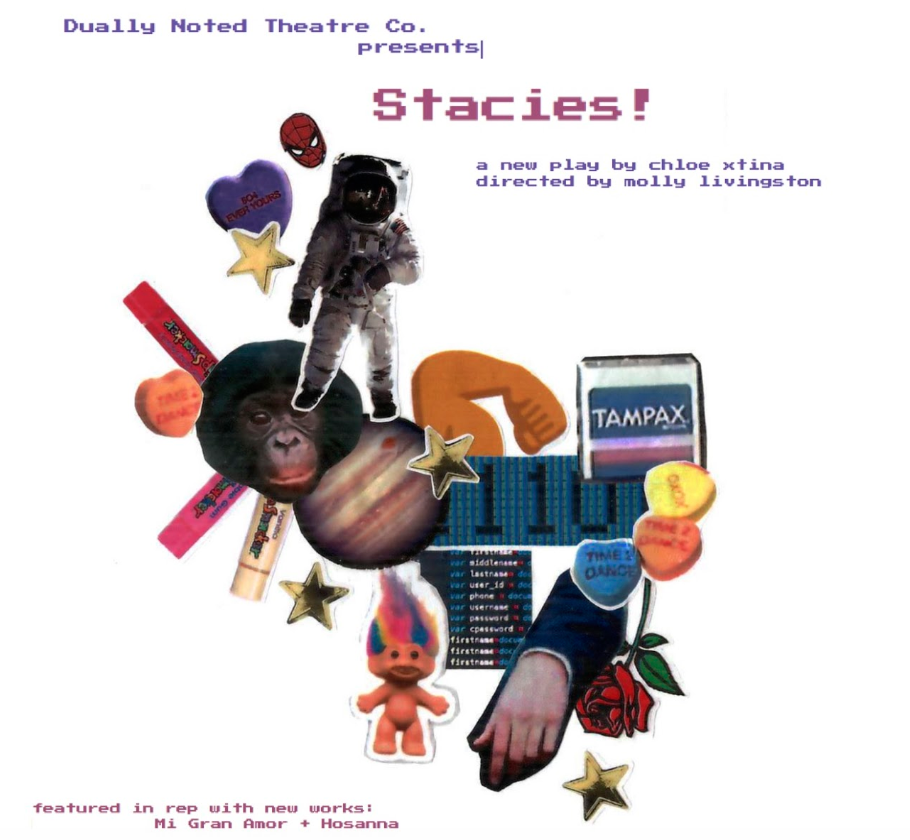“Stacies!” Is a Grim Yet Honest Look at Adolescence in the Digital Age

Image by Eve Anderson
“I don’t know how to prove to anyone that I’m not bad.” — Words spoken by a 14-year-old boy deeply at odds with himself and his masculinity in Dually Noted’s first ever nonmusical, the poignant and unflinching “Stacies!” Finishing its weekend run at St. Alban’s church on May 5, S”tacies!” is, in the words of playwright Chloe Xtina, “Ladybird meets Black Mirror,”— a magical realism play that explores how to come of age while bathed in the light of a screen.
“Stacies!” follows three teens as they navigate the timeless themes of young love, self-expression, and masculinity, as well as how virtual spaces now mediate all of these experiences. Self-assured yet naive Christie (Julia Ribas) strikes up an internet romance with bonobo.boy (Tieren Salstrand), the aforementioned 14-year-old drowning in uncertainty, much to the frustration of her blunt, cynical friend Kelly (Jeilani Rhone-Collins). As Christie and Kelly hash out their differences both on and offline, bonobo.boy’s search for how to be a “guy’s guy” leads him to a subreddit dominated by self-described beta-males and incels (short for “involuntarily celibate”— this refers to men who blame their sexual inexperience on women). Surrounded by their resentful rage, bonobo.boy takes on a second identity as supreme_scarfaceluvr and joins the “Beta uprising”.
Playwright Chloe Xtina wrote “Stacies!” after years of fascination with these deeply troubling internet forums. A breeding ground for misogyny and other forms of hatred, subreddits like r/TheRedPill assert that feminism oppresses men, women only have sex with the same hyper-masculine “Chads” they claim to hate, and that men are the real victims in all this. Despite celebrating terrorists, these forums and other online communities of the “manosphere” continue to attract large numbers of followers. As “Stacies!” explores, they also serve as a “bonding opportunity” for confused and impressionable young men seeking answers from other men.
“Stacies!” makes manifest this increasingly blurred line between the virtual world and real life. Xtina explains that in 2019, “The internet… is as much a part of the real world as we’d rather it not be,” and the play reflects this. Scenes unfold in both cyberspace and the material world with little differentiation between the two, emphasizing that the consequences of what’s said online versus off are now largely the same. During a fight with Kelly over social media, Christie threatens to log off, then falters as she seems to realize her own dependence on the online platform. While the clothes adopted in cyberspace (colorful Y2K fashion for the girls and different versions of internet “monsters” for the boys, such as a troll) indicate the altered reality of the internet, the message remains the same: we now live in two worlds.
The consequences of this dual existence reveal themselves in how the characters must reconcile the attitudes and information they receive in the virtual world with the reality of day to day life. Even when interacting in the real world, Christie and Kelly butt heads over ideas and phrases generated from online discourses, like “corporate feminism” and sex positivity. Completely awash in competing ideas about what masculinity means in 2019, bonobo.boy ends up in possibly the most toxic space for a young man struggling to form his identity.
This is what is perhaps most striking about the play: the attention given to the particular difficulty of young men grappling with their masculinity in an era in which incels, feminist discourse on masculinity, and polished, classic images of masculinity all coexist, sometimes on the same platform. Bonobo.boy struggles with himself from the first scene of the play, when he labors over his opening message to Christie, to his admission that he responds to his own anger by thinking he’s “too nice to be angry,” to his creepy attempts to flirt with Christie. Offline, we hear other men from the incel forum air their own desires to be seen, to care and not care, and to have power. Though often disturbing, these confessions honestly express the reality of growing up in a time when there is rarely a consensus on what ‘being a man’ means. This is not a comforting message, but, rather, a truthful one, and this truth is the crowning achievement of “Stacies!”.




